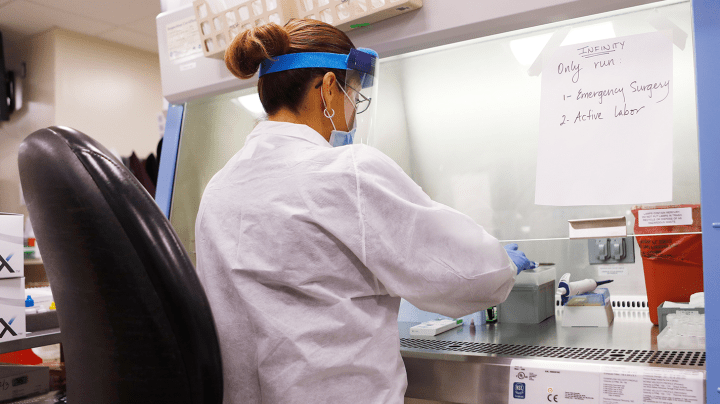These 3 Latinas Scientists Are at the Forefront of Fighting Against the Spread of COVID-19

Adriana Cardenas, a medical technologist processes test samples for the coronavirus at the AdventHealth Tampa labs on June 25, 2020 in Tampa, Florida. Photo by Octavio Jones/Getty Images
They call themselves “Las Tres Mosqueteras (The Three Musketeers),” and they certainly live up to their nickname being on the frontline of fighting against the spread of the Coronavirus.
The three Latinas in lab coats are Connie Maza (33), Monica Mann (34) and Elizabeth Zelaya (36). The scientists and medical technologists are part of a small team in Washington, D.C.’s Department of Forensic Sciences’ Public Health Laboratory Division. The trio has been working in the lab for a number of years, when in early 2020 they were thrust together into the spotlight after testing and reporting the first, initial COVID-19 cases in the area.
Since the early days the heaviness has been constant. “It’s just unbelievable, the pressure we had. We were under a microscope at that point,” Maza said. “It was scary at first. I was very nervous.” Over 12 months later, the ladies have seen cases skyrocket across the world and all while they remained at the forefront of the pandemic. The women have gone from reporting cases, to identifying and analyzing different Coronavirus mutations, and now onto seeing how the variants spread.
It’s a job that still comes as a surprise to people Zelaya told NBC News.”I do get that sometimes when people ask me what I do. I tell them I’m a scientist and they’re like, ‘Really? What?’ It’s like, ‘Yeah, sure am. I can tell you about some DNA if you want to learn,” she said. The reality is that while it is still revelatory for society, the numbers actually support the accepted stereotype of STEM consisting predominantly of men.
STEM (science, technology, engineering, and mathematics) careers is not a field that is made up of women-in particular Latina women. Even though women make up almost 50% of the population, only a third of the workforce working in science and engineering fields are women. Even worse, Latinas make up only about 2% of STEM degrees earned according to a 2016 National Science Board study.
The lack of Latinas in their field is an ever present thought in their minds. “You know what used to be the medical field, the science field, laboratory field being run by white males? Now, it has turned into this beautiful rainbow of colors,” Mann said. For her colleague Zelaya, it’s even bigger than that. “Every day I reflect and I’m like, ‘Wow, this is probably going to be in a history book.’”
Their work is far from being over. The pandemic still has a significant hold over the nation and the world. But, the end is in sight for the first time in a long time for the women who are very much looking forward to vacation.”Vacation together? Yeah!” said Zelaya.